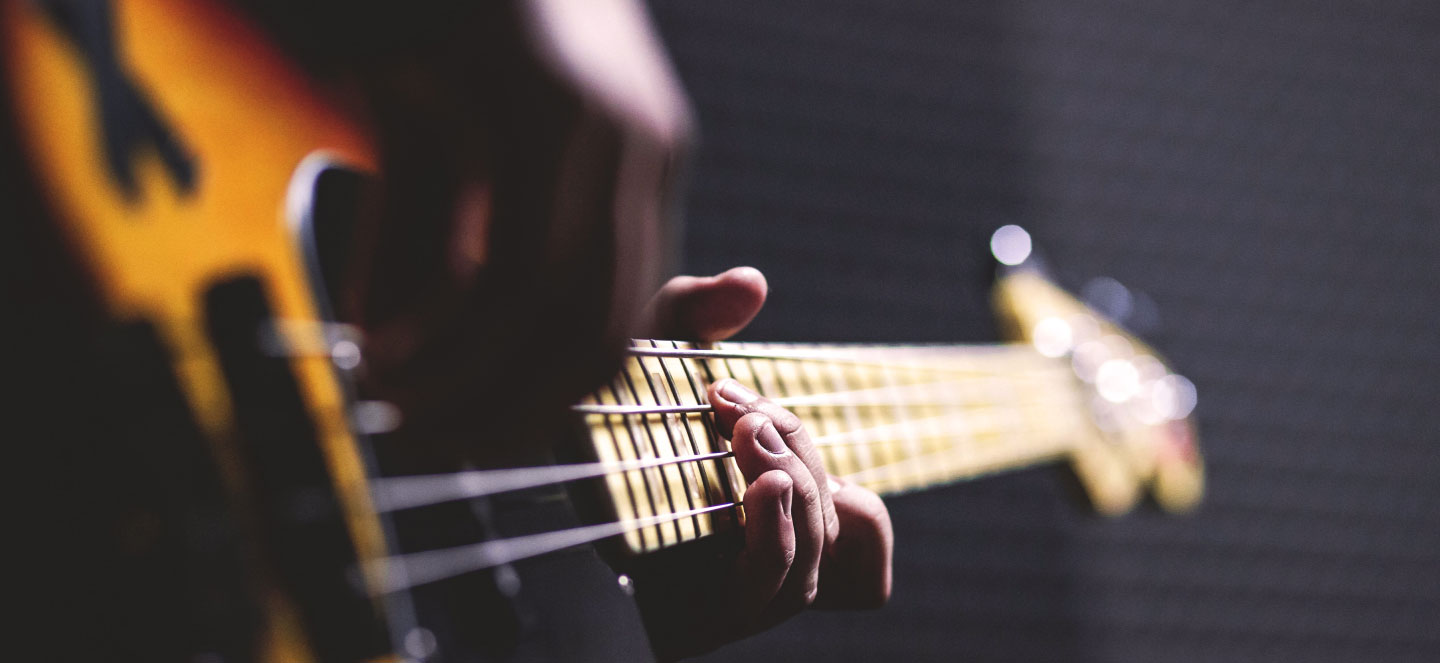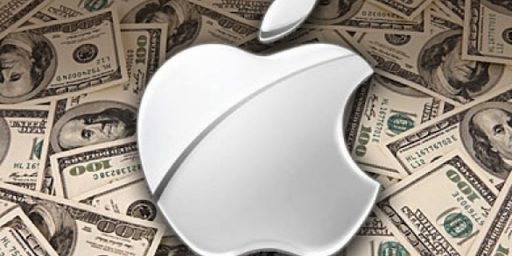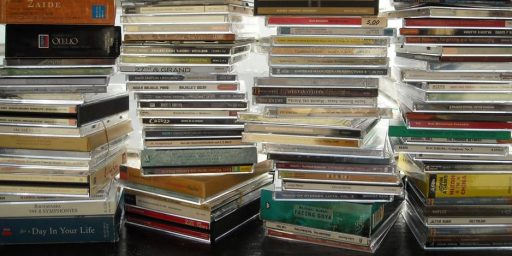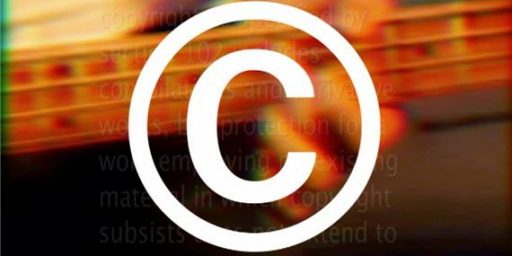Socialize Music?
A really weird proposal to solve a problem that probably doesn't exist.

The Week’s Ryan Cooper lays out “The case for music.gov.” Perhaps not surprisingly, I don’t find it particularly persuasive.
As I write this article, I am listening to the band TesseracT on Spotify. The service is quite a bargain for me — I can listen to virtually any record ever made, for just $9.99 a month. But it’s not such a great deal for TesseracT, which gets just $0.00348 for each song of theirs I play. If I listened to their album “Sonder” on continuous repeat 24 hours a day for the next year straight, they would receive just $355.90.
At first, that sounds like TesseracT is getting royally screwed. Until I realize that, in the olden days, Cooper would have bought the album for considerably less than $355.90. It turns out that Tower Records has it for $13.92 (plus shipping at a rate that I have to fill out a bunch of forms to determine) and Amazon has it for $14.98 with free two-day shipping for Prime members like myself. And TesseracT gets substantially less than all of that.
Streaming services like Spotify have wreaked havoc on the livelihood of musicians around the world. In time they may even destroy the artistic ecosystem on which they depend. There is one obvious solution: full communism for music.
So, again, Cooper has yet to establish the creation of havoc. Nor why I should care if it had. There’s already more music out there than I can possibly listen to and, as far as I can tell, people are continuing to make more of it under the current model.
This is followed by several paragraphs about natural monopolies, consolidation, and the like. Which leads to this:
YouTube, Spotify, and the French company Deezer totally dominate the streaming market, and numerous competitors have already been bought out or gone out of business. Worse, a private music streaming monopoly is plainly already tending towards an artistic monoculture, where a few big names take home most of the money and everyone else gets scraps.
So . . . I’m skeptical. I pay for YouTube Premium and extra for Amazon Music Unlimited. My wife has a Spotify account. For ease of math, let’s call that $30 a month, although it’s likely more. That’s roughly the price of two TesseracT albums. At this stage in our life, I don’t think we’d be buying two albums a month. (Although, granted, our kids are also using those accounts and maybe they’d be buying albums if that were still a thing.)
While I pay some attention to the industry, I’m hardly an expert. But wasn’t it always the case that the superstars were making most of the money? And, maybe I’m wrong here, but it would seem that digital and the lack of need to distribute physical LPs and CDs makes it easier, rather than harder, for bands to make music available commercially.
For a natural monopoly, there are two classic policy solutions: regulation or nationalization. Power utilities around the country, for instance, are almost universally either owned by various levels of government, or are heavily regulated by government oversight boards. Regulation could work, but would require a lot of complicated oversight of private owners, who will always be attempting to squirm out from under the rules or capture the board to boost their profits.
Either option would require competent governance. But it would be cleaner and simpler for the U.S. government to simply buy Spotify outright and convert it into a public service. Its whole market capitalization is just $50 billion — a pittance in a $4-trillion budget — and has just a few thousand employees. If the American state can run the vast complex of dams and power plants in the Tennessee Valley Authority, surely it can run one moderately large web service.
So, let’s just handwave the notion that the Federal government could run Spotify as competently as the people who created it out of nothing and turned it into a “natural” monopoly. And let’s concede that, absurd as it sounds on its face, $50 billion is indeed a pittance in the scheme of a bloated Federal budget and that “a few thousand” employees could be absorbed. Again, to what end?
Now, one could set up music.gov in many ways. But let me suggest a sketch of a business structure. First, all U.S. copyright holders will be required to license their content for a reasonable fee. Second, YouTube (and any other American company that streams music) will be required to set up copyright claim systems that actually work, instead of the current system that allows for rampant copyright infringement, constantly dings people for legal “fair use,” and is also easily abused. This would likely drive the company out of streaming altogether.
So, we’re going to simultaneously own the streaming platform at considerable taxpayer expense to enact “communism” for musicians while also have competing platforms? Why the hell would we do that?
Third, artists would be paid progressive streaming rates: (let’s say) a penny per play for the first million streams per month, $0.0075 for the next 500,000, $0.005 for the next 500,000, and gradually decreasing from there. These numbers are just a rough guess, but the point is to redirect the flow of streaming income more towards middling artists, thus pushing against the winner-take-all dynamic that prevails on Spotify. The only people who make real money from streaming at present are superstars like Taylor Swift who get billions of plays — and even for them it’s a small share of what they get from concerts, endorsement deals, merchandise, album sales, and so on.
Again, I don’t understand the business model. The taxpayer now owns the streaming service. But we’re also going to pay artists more than they’re being paid now? And, somehow, this is going to direct more money to artists few people are listening to at the expense of Britney Spears because, well, fuck her for making music people like? And where is that money coming from? Our competitor, YouTube?
Fourth, there will be no recommendation algorithm. Listeners will have to search out their own music, and create their own playlists (which they will be able to share). This will push back against the commodification of music, which is degrading the art form. Spotify’s algorithmic recommendations tend to turn music into an aural wallpaper that one barely listens to — I’m sure I’m not the only one with long Spotify playlists full of artists I barely recognize. And once more there will be an important role for music journalists and critics to find and raise up new artists.
So . . . let me get this straight. We’re going to buy out Spotify for a cool $50 billion and then take away the feature that made Spotify a natural monopoly to begin with? Because Cooper doesn’t like the fact that too many people are listening to artists who are popular and not enough are listening to . . . TesseracT, I guess?
And, hell, if we’re going all communist and making a Spotify that doesn’t Spotify, why not just outlaw Spotify and other competing services and just throw the music up on a server somewhere? Absent the recommendation algorithms, what is even the point? To make me read music journalists for recommendations that I get automatically right now? What in the actual fuck?
Fifth, only artists will receive particular data about their listeners — music.gov will not collect any personal information itself. This is the reverse of current practice, in which artists get nothing and Spotify is keeping tabs on every song you listen to. That is both invasive for listeners and a huge headache for artists, who lose out on valuable information on their fans that could be used for sales and planning concerts.
Well, okay. But why do I care about any of this?
Finally, listeners would still need to pay up — but not much. Currently Spotify’s headline subscription rate is $9.99 per month, though it has various discounts for students and families. The entire global recorded music industry took in about $21.6 billion in 2020, of which Spotify took in about a third. Given historic and projected industry growth rates, probably all that would need to be done to make the service pay for itself over the medium term would be to nudge up the price a bit, and let subscriptions continue to roll in. Or we might choose to subsidize it with a few billion dollars in public funds.
So, a few billion dollars in public funds to solve a set of problems that essentially nobody in the general public cares about? That will go over really well with the public.
I’m sure to many readers this proposal sounds rather extreme (and we might haggle over details). No doubt Republicans would have a conniption fit over the prospect of Cardi B earning millions through a public service. But if we want music to remain a thriving part of American culture, something must be done
So, first off, Cooper isn’t describing a public service. Somehow, we’re going to spend $50 billion for an existing service, spend billions more to pay its employees, subsidize if for several billion more, and raise prices over what an ostensible monopoly is already charging. And take away the feature that made the monopoly a monopoly in the first place. That really is communism.
I am actually persuadable that having “music to remain a thriving part of American culture” would be worth a substantial government subsidy if there was the actually a threat to that reality. But, even as a middle-aged guy who spends more time listening to podcasts than music, I still find plenty of new and new-to-me music to listen to on a regular basis. There are oodles of new artists making it every year, just as there always have been.
For that matter, to the extent consolidation of the industry is actually a threat to the ability of artists to make a living, wouldn’t the more natural government response be to break up said integration?






This bit from Cooper’s piece seems to me to completely invalidate one of his own core premises:
[emphasis added]
These are, one must infer, artists to which Cooper would never have been exposed had Spotify’s algorithm not recommended them. They are getting listened to, and they wouldn’t have been previously.
Maybe I’m misreading him, but it appears Spotify is actually doing the opposite of what he claims it does.
Anyway, I agree with you, there isn’t a problem here that needs solving by nationalizing a streaming music service. Maybe Cooper’s just being a hipster snob or whatever.
I’m old and listen only to non-art/classical stuff from my teens and twenties, but it does seem like streaming is terrible if you’re looking for what I grew up with–liner notes, obscure references, college radio, cool record stores with albums from bands you had no reference towards. There was also economic privation. When you bought a Shellac album that sounded like gurgling mud that was your $15 down the drain. You had to figure out why everyone loved it, or pretended to love it.
Streaming has done away that model, mostly. It curates your music for you. If that’s what you want, fine. And it pays even worse for the musician. I knew a guy who was a post-punk guitarist. He had a ton of bands, some mildly-famous, and he made his money producing albums, and that was at the heyday of record stores. I literally have no idea how musicians other than the big ones survive, even with touring.
Does that mean that the music will be Absolutely Free?
Encore
The Golden Age that us oldsters remember was built on just the right kind of technology. “Streaming” bandwidth existed (AM radio) but was so limited that the owners acted as gatekeepers. Copying was just cheap enough (vinyl) that people could afford it, but expensive enough that producers acted as gatekeepers. And since gatekeepers don’t like to deal with too many acts, they didn’t. And because a limited number of artists were popular, tours with recognizable names were possible. Before that juxtaposition, musicians were for the most part poor and rambled around the country finding places to play.
Today? Streaming’s problem isn’t that the bandwidth is limited, it’s that it’s a firehose and finding specific things is hard. Even with algorithms like Spotify’s. Copying is so cheap that the $50 thumb drive I keep plugged in for media and backups holds dozens of movies and software/data whose purpose I’ve completely forgotten. Touring can still be lucrative, but not for very many artists. So we’re returning to the days when musicians are poor and ramble around the country finding places to play.
What problem is this supposed to solve?
The true threat to music remaining a thriving part of American culture isn’t to recorded music, it’s to live music. COVID has been brutal for live music venues and many, especially the mid-size venues, won’t survive. Performing Arts (like theater, orchestras, opera, and dance) were hard hit as well. I’d support government subsidies to keep that alive, but progressive metal bands like TesseracT are a dime a dozen.
@Scott F.:
I don’t want to think how many Denver venues are gone forever. Denver’s always been big on the mid-sized places, and over the couple of years pre-Covid a ton of money got spent. Everything from big upgrades at names with history like the Fillmore, to entirely new places in RiNo. I didn’t see how even pre-pandemic Denver could support them all. Their only chance is that someone could roll over the debt problems with the Federal Rerserve’s “businesses above a certain size can roll debt over at zero interest” policy.
Cooper isn’t the only one complaining about Spotify.
Bill Maher here pokes fun at a similar Rolling Stone article about unfair spotify is.
Anyway, Cooper’s ideas are dumb but also inefficient. Just implement a UBI and artists will get paid regardless of how crappy and unpopular their music is.
Agreed that this was a less than convincing article.
Also agreed about the devastation to live musicians and venues noted by @Scott F. and @Michael Cain
But those are side issues to the main point of my comment….which is to signal boost grumpy James. Or perhaps it’s his evil twin Jimmy. Whomever it is, I fully endorse more of this (when appropriate, as it was here):
I think this is the most important issue we face. Fuck covid, I’m so over covid, this should be at the very top of Joe Biden’s agenda. The survival of western civilization is at stake. But I don’t think this should be some one-off program, clearly what’s needed is a new cabinet position. Secretary of Music. I nominate Beyoncé.
@Michael Reynolds: Why’s it always gotta be woman as secretary?
I have to admit: I find and listen to more music via Spotify than I ever would have if we were still going to record stores. I am unlikely to spend $15 on a random album from an artist I never heard of (or one that I had heard of) just to try it out, but with Spotify I am very frequently listening to new (to me, at least) music.
@Steven L. Taylor: Yup. The algorithms at YouTube, which I pay for to avoid ads and because they have a lot of live recordings, are pretty good at unearthing music and artists I would never encounter otherwise. And, often, it’ll be a song from 10-15 years ago that I never encountered for whatever reason or a live version of a song whose studio version was comparatively meh.
I have yet to have Netflix, Hulu, Amazon or iTunes ever ‘suggest’ anything I wanted to watch or hear. I get emails: We picked this for you! No, no you didn’t. And a lot of the time the suggestions are insulting. As in, WTF would make you think I want to watch that?
YouTube, OTOH, does occasionally get something right.
@Mimai:
Oh, that’s easy: because we can pay them less.
The amount of musicians that make liveable money off releases and touring is tiny compared to the whole.
Most everybody has a day job or some side gig. Playing live is often beer money. The headliner likely gets a potion of the door take.
Selfishly, I love music services. I have been exposed to songs and bands and genres I would not have known about. Some of the recommendation algorithm actually provide interesting choices. (Pandora is garbage, imo. Youtube provides the most interesting in that it is heavily weighted towards people who listen to this also listen to this – it’s like your hipster friend. Your super exploitative, privacy mining, aggressively capitalist scenester friend.)
My exposure and taste has increased exponentially in the last twenty years due to music streaming.
The pandemic death of music-oriented bars and clubs is heartbreaking. Owners and staff suffer, plus your bands’ narrow avenue for earning cred just got narrower.
I might be pining for past days, but live performance and word of mouth used to be the ticket up. Losing that hurts.
@Michael Reynolds:
If I have you pegged correctly on music, I highly recommend The Great Apes’ Edge Of The Western World. Check it out if you like Rancid.
When I see such terms as “music.gov” and “substantial government subsidy”, I start looking for the section regarding what the (dot)gov folks will, or will not, allow to be played. The People’s Cabinet of Acceptable Music is kinda strict about what airs.
@de stijl:
Thanks dude.
@Michael Reynolds:
I have a great affinity for NorCal punk.
When I was surface respectable I got shipped out to SF for work shit several times a year for days or weeks at a time.
By day I was tie guy IT dude. By night I prowled back alleys for the gritty shit.
The sucky thing is I had to head back to hotel at 11 or 12 on school nights and strictly manage chemical intake so I could be semi-bright eyed and bushy tailed next morning.
Adulthood basically sucks, but it afforded me the time and money to explore a new scene.
I really enjoyed that.